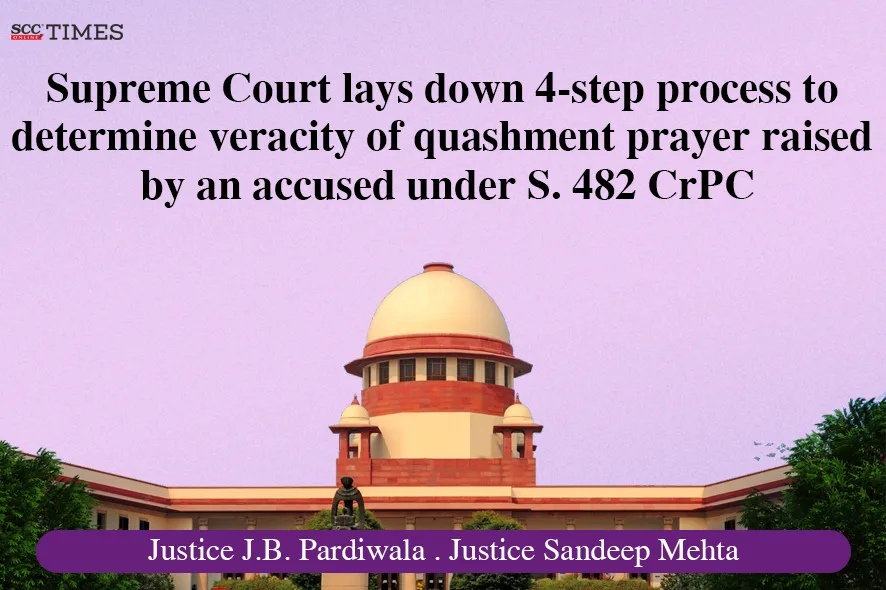Supreme Court: While deciding this appeal arising from an order passed by Allahabad High Court by which the High Court had dismissed the appellant’s petition seeking quashment of summoning order, the Division Bench of J.B. Pardiwala and Sandeep Mehta, JJ., laid down certain steps which must be followed to determine the veracity of a prayer for quashing, raised by an accused by invoking the power vested in the High Court under Section 482 of the CrPC:
-
Whether the material relied upon by the accused is sound, reasonable, and indubitable, i.e., the materials is of sterling and impeccable quality?
-
Whether the material relied upon by the accused, would rule out the assertions contained in the charges levelled against the accused, i.e., the material is sufficient to reject and overrule the factual assertions contained in the complaint, i.e., the material is such, as would persuade a reasonable person to dismiss and condemn the factual basis of the accusations as false.
-
Whether the material relied upon by the accused, has not been refuted by the prosecution/complainant; and/or the material is such, that it cannot be justifiably refuted by the prosecution/complainant?
-
Whether proceeding with the trial would result in an abuse of process of the court, and would not serve the ends of justice?
Background:
The complainant lodged a private complaint before the Additional Chief Judicial Magistrate, Allahabad on 11-08-2014 for the offence alleged to have been committed sometime in 2010. The complaint came to be lodged for the offence punishable under Sections 323, 504, 376, 452, 377 and 120-B of the Penal Code, 1860 (IPC) respectively and Section 3(1)(10) of the Scheduled Caste and Scheduled Tribe (Prevention of Atrocities) Act, 1989 (SC/ST Act). At the time of filing of the complaint the same was labelled as an application under Section 156(3) of the CrPC.
However, the Magistrate, instead of ordering police investigation under Section 156(3) of the CrPC as prayed for by the complainant, thought it fit to take cognizance upon the complaint; issuance of process was postponed as a magisterial inquiry was initiated under Section 202 of the CrPC. On completion of the magisterial inquiry the Magistrate proceeded to issue process for the offence of rape punishable under Section 376 of the IPC.
Being dissatisfied with the order passed by the Additional Chief Judicial Magistrate, the appellant challenged the same before the High Court under Section 482 CrPC. However, the High Court declined to interfere with the summoning order and accordingly rejected the application.
Court’s Assessment:
Considering the case and perusing the legal trajectory, the Court opined that the Additional Chief Judicial Magistrate committed an error in passing the summoning order. The High Court too overlooked the relevant aspects of the matter while rejecting the application. The Court further pointed out that on a plain reading of the complaint and considering the nature of the offences stated therein, the allegations did not inspire any confidence. Furthermore, there was no explanation as to why it took 4 years to file the complaint. The Court further noted that the complainant did not accept the notice issued by the Court.
The Court emphasised that the duty of the court in cases where an accused seeks quashing of an FIR or proceedings on the ground that such proceedings are manifestly frivolous, or vexatious, or instituted with an ulterior motive for wreaking vengeance, has been elaborated in Mohammad Wajid v. State of U.P, 2023 SCC OnLine SC 951.
The Court further explained that there is a clear distinction between rape and consensual sex and in a case where there is a promise of marriage, the Court must very carefully examine whether the accused had actually wanted to marry the victim, or had mala fide motives and had made a false promise to this effect only to satisfy his lust.
Therefore, the Court laid down the aforementioned step which must be followed by the High Courts to ascertain the veracity of a quashment application made by an accused. The Court stated that if the answer to all the steps is in the affirmative, then judicial conscience of the High Court should persuade it to quash such criminal proceedings, in exercise of power vested in it under Section 482 of the CrPC. Such exercise of power, besides doing justice to the accused, would save precious court time.
The Court stated that the High Court should have exercised its inherent powers under Section 482 of the CrPC for quashing of the criminal proceedings. The Court opined that continuation of the criminal proceedings against the appellant would be nothing but gross abuse of the process of law. Hence, the impugned order of the High Court was set aside and proceedings against the appellant pending before Additional Chief Judicial Magistrate, were quashed.
[Pradeep Kumar Kesarwani v. State of UP, 2025 SCC OnLine SC 1947, decided on 2-9-2025]
Advocates who appeared in this case:
For Petitioner(s): Mr. Rahul Kaushik, Sr. Adv. Mr. Bibek Tripathi, Adv. Mr. Y. Lokesh, Adv. Mr. Sudhakar Tiwari, Adv. Mr. Ajay Kumar Shrivastav, Adv. Mr. Mohit Kumar Gupta, Adv. Mr. Akshat Srivastava, AOR
For Respondent(s): Mr. Adarsh Upadhyay, AOR Ms. Pooja Singh, Adv. Ms. Pallavi Kumari, Adv. Mr. Shashank Pachauri, Adv.









